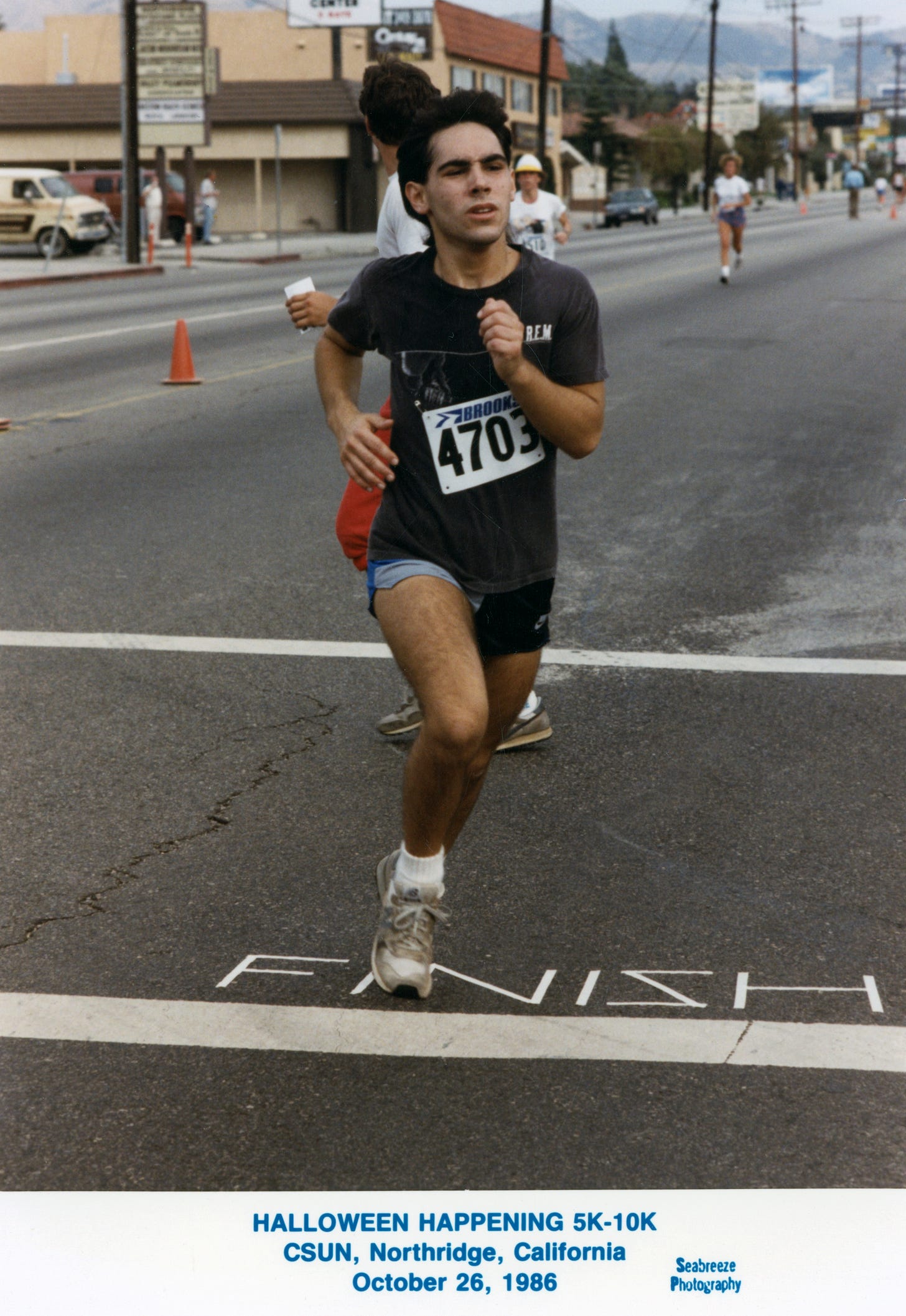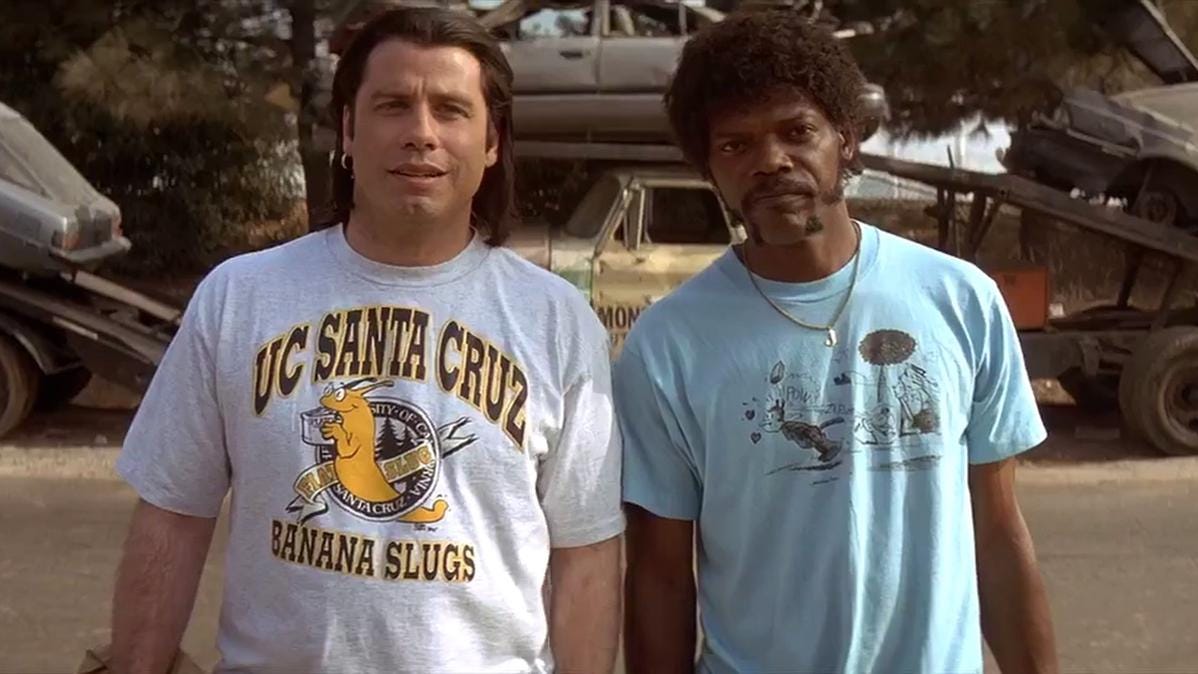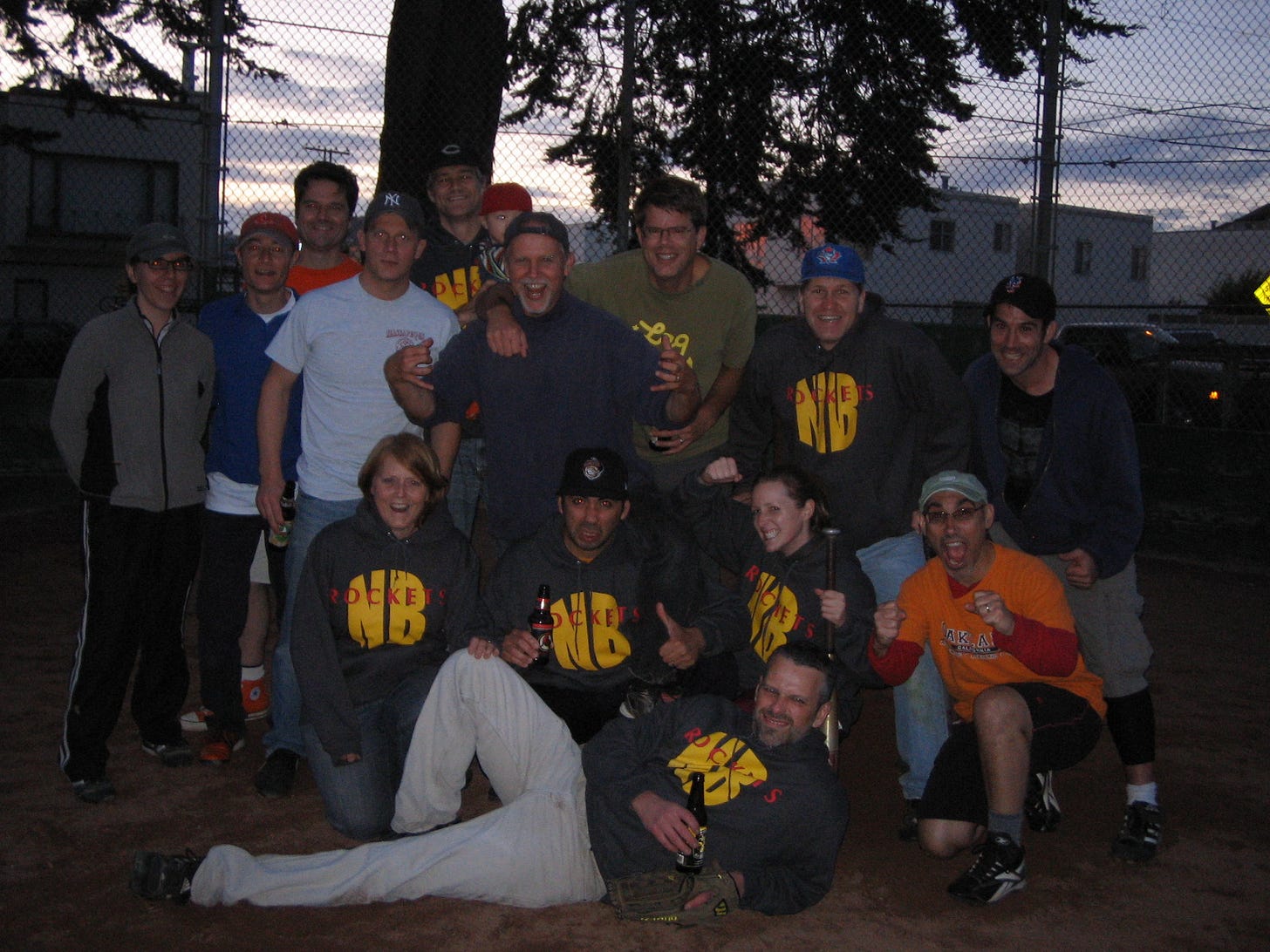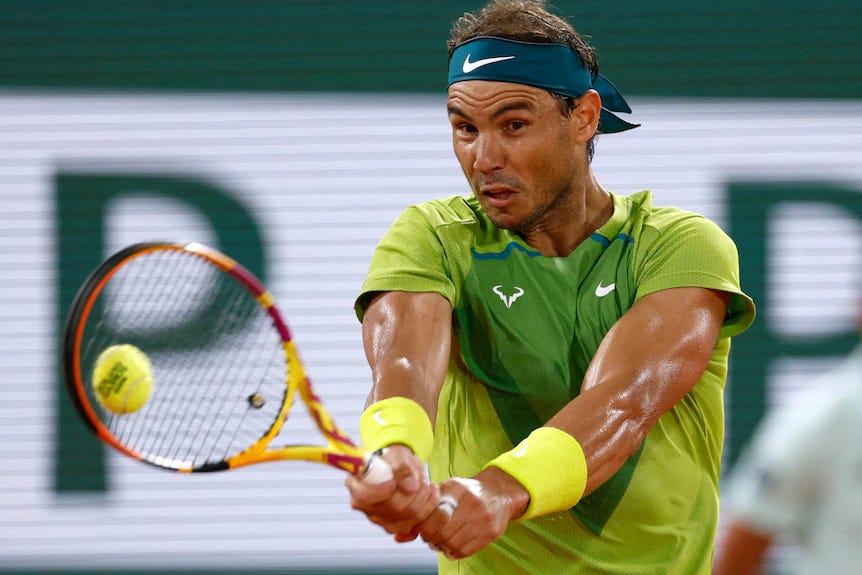
I love tennis.
I love playing it, I love watching it, I love re-watching it, I love reading books about it. I love talking about it with other tennis fans and even non-tennis fans (until they walk away from me).
On Sunday, my favorite player, Rafael Nadal, won the French Open for a record 14th time at the age of 36. I know, 36 doesn’t sound old, and it isn’t, but in the men’s professional singles tennis world, it’s considered ancient. The previous oldest winner, Andres Gimeno, was 34 when he won the French Open in 1972.
It’s undeniable, the toll playing professional tennis can have on the human body. It’s the rare career player who avoids serious injury and multiple surgeries. Rafa has been dealing with foot pain for years and it’s only gotten worse lately. He announced in his post-victory press conference that he’d had an injection to numb his foot before the match so that he could run and move without intense pain. He’s got the best team of physio experts with him 24/7 and still he’s being held together with scotch tape and anesthesia. I play only casually and for decades have struggled with chronic tennis elbow, hip pain and other assorted tweaks and dings. But it’s all been worth it for the possibility to experience one of those mythical, mystical 20-30 hit rallies with my buddy Mike (or anyone else I happen to play with).
The high I get when I swing my Babolat Pure Aero (Rafa’s racket) and connect with the ball right in the sweet spot and send it exactly where I want it to go….there’s nothing quite like it.
Not even actually getting high, which is what I was doing quite often when I first began playing tennis the summer before my Junior year of high school.
My family had moved from our house in Agoura, California (now called Agoura Hills….just add a “hills” to your city and watch the property values soar!) to a condo in Northridge, smack dab in the center of the San Fernando Valley. The condo complex had a pool and a tennis court, both of which I, and my new friend Dave Schwartz, took advantage of as often as we could.
Neither of us knew what we were doing, but we were idiot 17-year-olds who loved to run around, and we eventually became fairly decent at the sport despite the bong hits we’d rip prior to hitting the court.
As a sports fan, I knew the legends of the game: John McEnroe, Bjorn Borg, Billie Jean King, Martina Navratilova, Chris Evert. But I didn’t know the rules; I didn’t know the strategies. So I began to watch matches on TV. I listened to the announcers explain the nuances of pace and angles, the benefits of staying on the baseline, of developing a serve and volley game.
When I moved away two years later to attend UC Santa Cruz, on a lark I decided to try out for the university tennis team. UCSC had only two college sporting teams: rugby and tennis. (Don’t double check me on this.) Both were top-rated in the state. There was no way I could possibly make the team.
I played out of my mind during the first round of tryouts, smacking balls like I was the second coming of Jimmy Connors, and was invited back for the second round. The final picks would be chosen from this group.
I’ll ruin the suspense right now. I didn’t make the team.
Which was fine. I was not good. I could hold my own on a neighborhood tennis court or playing against my friends, but for an actual college team where I would play against other teams and have line judges and fans watching in the stands? That was definitely several steps beyond my ability. It boosted my confidence, making it to the second round of tryouts, but I was happy smacking balls on the campus courts with my friends Christie and Sam, maintaining my level of play with the occasional bong hit, before and/or afterwards.
Tennis (singles tennis that is — doubles is another beast entirely) is the perfect sport. It’s not as repetitive or solitary as running or cycling. You are alone, but there is a partner/opponent on the other side of the net (hopefully someone you like). How well or how terribly you play is all dependent on you. No excuses. Team sports are great, don’t get me wrong, but I am a selfish athlete. I am not good at interpreting when I should be aggressive and take charge or step back and let another person handle a particular aspect of the game.
For example, I am on a softball team, a team I’ve played on for more than a decade. I love my teammates and I look forward to each game with the same excitement as I did when I first joined. But the games I find the most satisfaction in are the ones when I am the pitcher. I control the pace of the game (well, in my mind I do) and I often seethe inside when a teammate makes an error. It’s a ridiculous reaction — I’ve made plenty of errors myself — but I think it’s because I want us to win so bad, or I want ME to win so bad, so my teammates’ errors are in essence my own errors. I can easily get caught in a confusing shame/blame spiral.
In singles tennis, my errors really are my own errors. And my winners are my own winners. Sure, I have been known to blame my tennis mistakes on a long list of factors beyond my control — the wind, that annoying kid on the adjoining court, my glasses (and thusly my optometrist, my parents, my genetics), a crack in the cement, a bird flying by — but deep down I know it’s my form, my timing, my focus, and the simple fact that no one is perfect.
Not even Rafa Nadal.
There are games, even entire matches where my tennis crush gets crushed by his opponent. When Rafa’s lethal forehand down the line goes wide every time. When the timing of his patented amazing return of serve is off. When he makes more errors than winners. Nadal doesn’t pout or whine or break a racket over his knee. He is constantly working to improve his game, his attitude, his perspective.
During the semi-finals match at the French Open, his opponent, Sascha Zverev, who was pushing Rafa to his limits in what was shaping up to be the best match of the tournament, twisted his ankle running for a ball and collapsed to the ground. Rafa immediately ran over to him to make sure he was okay, and when Sascha was taken off the court in a wheelchair, Rafa went into the medical room to be there for him and offer any support. During the press conference after Zverev had to retire from the match, Rafa talked about how he hoped Sascha was not injured badly and would heal quickly. How helping a fellow competitor out like he did shouldn’t be seen as some great noble thing; it should be our natural instinct.
As much as I’ve loved and admired Nadal’s supernatural tennis skills, his determination and grit, it’s the way he’s always carried himself as a human being, on the court and off, that has made him my favorite player in all of sport.
It’s probably the reason why Joe Esposito’s 1984 anthemic hit song “You’re The Best Around” appeared in my head at 4am on Sunday. Two hours before the start of the men’s final match at the French Open.
It was my dream self (or perhaps that’s being egocentric — it was my dream team!) wanting to pump Rafa up for his important match in Paris at Roland Garros. Maybe it was my dream team trying to wake me up so that I didn’t miss the match, even though I got home at 1am after seeing Midnight Oil perform an amazing concert on their final world tour. Would this year’s French Open also be Rafa’s final tour at the venue where’s he’s won 14 titles? Was this cheesy anthem about never letting adversity get you down a reminder of life’s impermanence? How we must not waste our time with doubt and disbelief? Was Mr. Esposito invading my brain with cliched and unrefined positivity because I was struggling to believe in myself? Or was its presence more an expression of my borderline obsessive feelings for Rafa Nadal?
If you are older or as old as me, you know this song as the musical equivalent to the Rocky theme (“Gonna Fly Now”) for a 1984 movie that I would argue is just as important to cinematic history as the 1976 Sylvester Stallone boxing epic.
Of course I’m talking about the Ralph Macchio (Elizabeth Shue, Pat Morita) classic, The Karate Kid.
Can you watch the above clip from the film without getting up from your couch or chair and punching a fist to the sky? It’s a riveting (and horribly dated) montage of Macchio’s Daniel working his way up the ranks during a karate tournament, as guys twice his size and weight (and age) are brought to their knees by Daniel’s Mr. Miyagi-instructed stork-stance and patented eye twinkle. His opponents fall prone from Macchio’s unbearable cuteness. And the 12 times the camera cuts back to Daniel’s love-interest, Ali (Shue), cheering from the sidelines are perfectly excessive.
I’ve had “You’re The Best Around” appear as my earworm countless times. It’s one of the most insistent loops in all of wormland. It takes method #5 (from my previous post about methods for defeating earworms) for me to rid my inner jukebox of this dastardly song. I apologize if I’ve gotten it stuck in your head.
In fact, it’s repeating over and over as I type this. If you only knew the strength, the will-power and perseverance it’s taking me to finish this post. It’s a catch-22, a conundrum — I need the inspirational message of my earworm to help me reach the end and make this piece “the best around.” Yet, it’s also keeping me from finishing it in a timely manner. It’s wanting me to use the phrase “the best around” in every sentence and I can feel myself wanting to do just that.
But what exactly does that mean, “the best around?” Why not just “the best?” What is “around?” Around the vicinity? Within ear or eye shot? Adding around sounds good in the rhythm of the song, but it feels like a qualifier. You’re the best around, but not the best ever.
I know I’m getting all caught up in semantics, but this questioning of word choice, of wondering how “around” equates to “in the world” has already released the firm grip this song has had over me. I can feel myself relaxing. I can feel other songs starting to enter.
I can feel that I’ve reached the end. That this piece, athough not perfect, is the best. Around.





